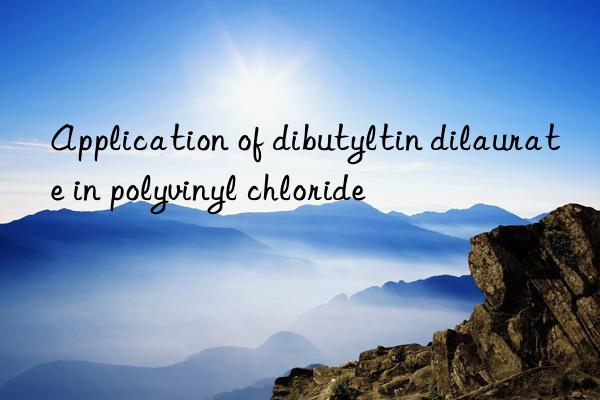
Dibutyltin Dilaurate (DBTDL), as an important organotin compound, is used in many fields due to its excellent properties It has found applications in the polyvinyl chloride (Polyvinyl Chloride, PVC) industry, where it plays a key role. PVC is a widely used thermoplastic favored for its cost-effectiveness, durability and versatility. However, PVC is prone to degradation during processing and use, especially thermal degradation, which limits its application scope. In order to overcome this problem, the addition of stabilizers becomes crucial, and dibutyltin dilaurate is one of the most efficient PVC heat stabilizers.
Application in polyvinyl chloride
Thermal Stabilization
PVC easily decomposes at high temperatures to produce HCl, which not only reduces the physical properties of the product, but also accelerates further degradation processes. Dibutyltin dilaurate can effectively capture and neutralize the generated HCl, preventing it from further attacking the PVC chain, thereby inhibiting the thermal degradation process and improving the thermal stability of PVC. This stabilizing effect enables PVC products to maintain their original properties and extend their service life during processing and use.
Increase transparency
In soft and semi-soft PVC products, such as transparent films, pipes, artificial leather, etc., dibutyltin dilaurate can not only provide thermal stability, but also maintain or improve the transparency of the product. This is important for applications that require good visual effects, such as packaging and decorative materials.
Lubricity and processability
In addition to being a stabilizer, dibutyltin dilaurate also has good lubricity, which can improve the fluidity of PVC during extrusion, injection molding and other processing processes, reduce friction, make processing smoother, reduce energy consumption, and improve Productivity.
Weather resistance
PVC products used outdoors, such as window frames, fences, etc., need to withstand the effects of environmental factors such as ultraviolet rays and temperature changes. Dibutyltin dilaurate can enhance the weather resistance of PVC, allowing it to maintain good appearance and mechanical properties under harsh conditions.
Catalysis
In addition to its application in PVC, dibutyltin dilaurate is also an effective catalyst and can be used in the vulcanization process of polyurethane foam synthesis, polyester synthesis and room temperature vulcanization silicone rubber. In these polymerization reactions, it can promote the reaction rate and control the reaction process to obtain high-quality products.
Conclusion
In summary, the application of dibutyltin dilaurate in the polyvinyl chloride industry is very extensive and important. Whether it is improving thermal stability, enhancing transparency, improving processability, or improving weather resistance, it plays an indispensable role. However, it is worth noting that despite the many advantages of dibutyltin dilaurate, its potential impact on human health and the environment cannot be ignored. Therefore, when using this compound, it is necessary to strictly abide by relevant safety regulations, take appropriate protective measures, and explore and develop more environmentally friendly alternatives to achieve sustainable development.
Extended reading:
bismuth neodecanoate/CAS 251-964-6 – Amine Catalysts (newtopchem.com)
stannous neodecanoate catalysts – Amine Catalysts (newtopchem.com)
polyurethane tertiary amine catalyst/Dabco 2039 catalyst – Amine Catalysts (newtopchem.com)
N-Methylmorpholine – morpholine


